Analysis of Sustainable and Responsible Tourism Management Practices
VerifiedAdded on 2022/12/16
|12
|4268
|309
Report
AI Summary
This report provides a comprehensive analysis of sustainable and responsible tourism management. It begins by defining the core concepts and differentiating between sustainable and responsible tourism, highlighting their parallel missions. The report then examines the role of leading global organizations like ABTA and UNWTO in promoting sustainable practices. It delves into tourism development and planning, outlining principles for reducing adverse impacts and explaining the planning process, including challenges. The report assesses the economic, social, cultural, and environmental impacts of tourism activities. Furthermore, it analyzes how sustainability principles are implemented to meet stakeholder expectations and measures sustainability management in various tourist destinations, with a specific focus on London as a case study. The report emphasizes the importance of eco-friendly practices, resource management, and the positive influence on economic growth and revenue generation within the tourism sector.
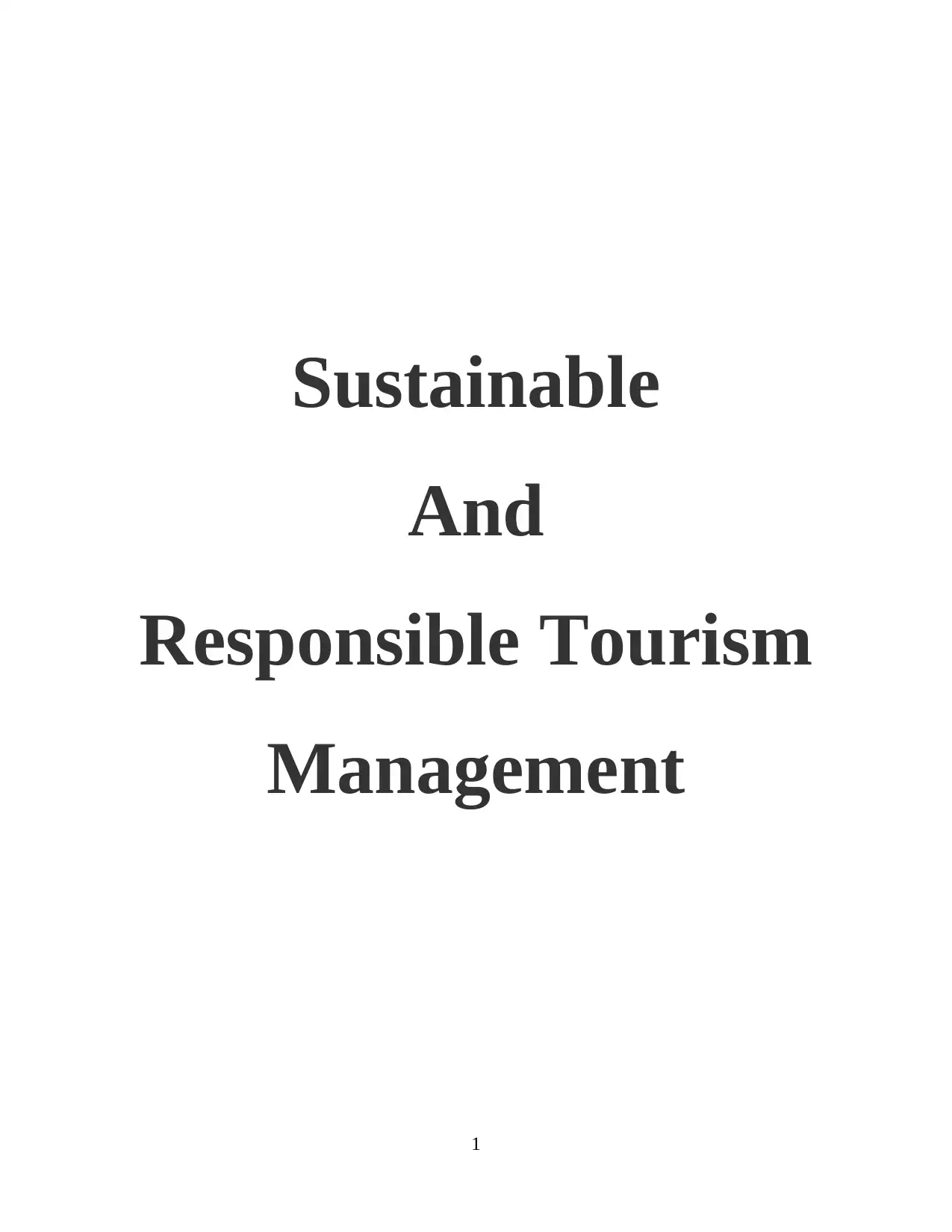
Sustainable
And
Responsible Tourism
Management
1
And
Responsible Tourism
Management
1
Paraphrase This Document
Need a fresh take? Get an instant paraphrase of this document with our AI Paraphraser
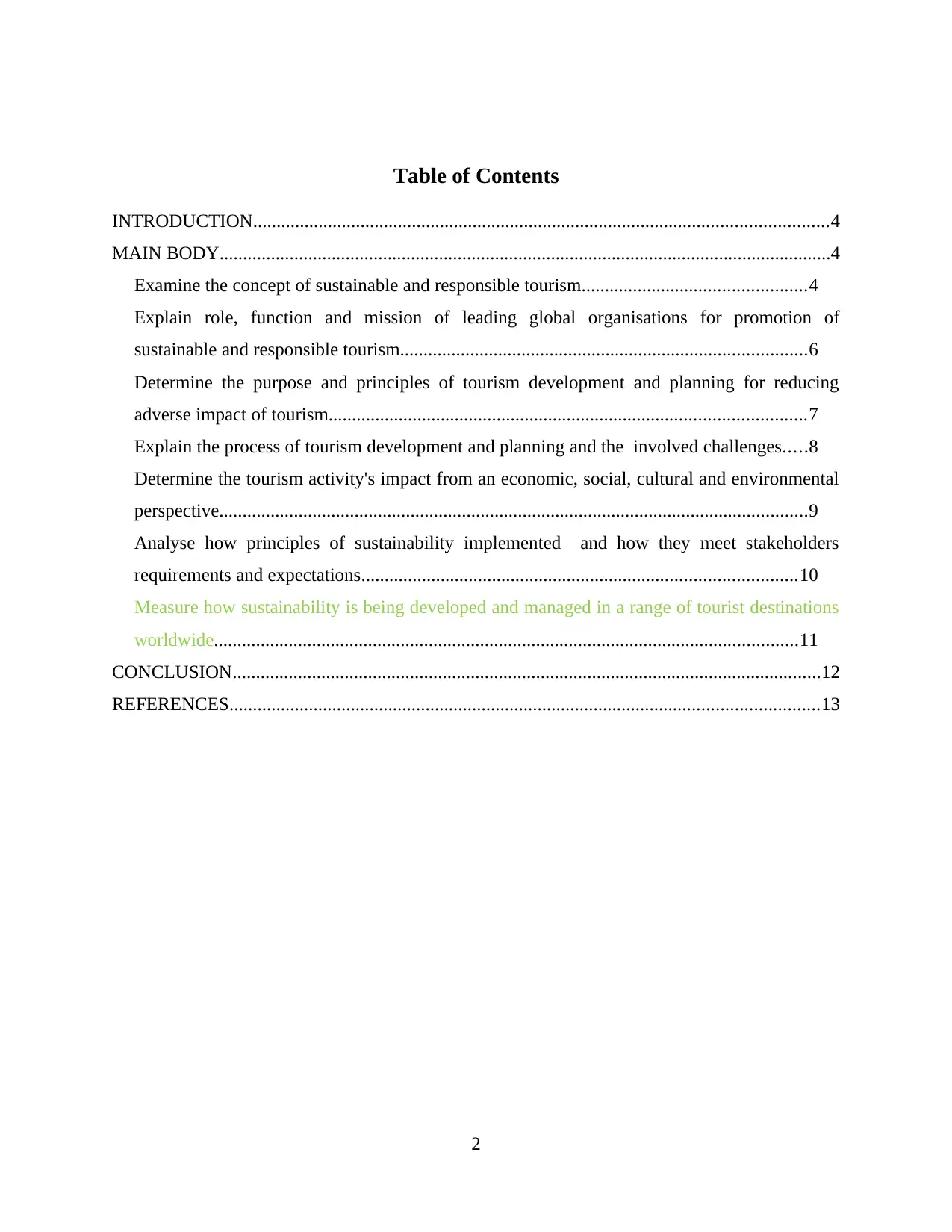
Table of Contents
INTRODUCTION...........................................................................................................................4
MAIN BODY...................................................................................................................................4
Examine the concept of sustainable and responsible tourism................................................4
Explain role, function and mission of leading global organisations for promotion of
sustainable and responsible tourism.......................................................................................6
Determine the purpose and principles of tourism development and planning for reducing
adverse impact of tourism......................................................................................................7
Explain the process of tourism development and planning and the involved challenges.....8
Determine the tourism activity's impact from an economic, social, cultural and environmental
perspective..............................................................................................................................9
Analyse how principles of sustainability implemented and how they meet stakeholders
requirements and expectations.............................................................................................10
Measure how sustainability is being developed and managed in a range of tourist destinations
worldwide.............................................................................................................................11
CONCLUSION..............................................................................................................................12
REFERENCES..............................................................................................................................13
2
INTRODUCTION...........................................................................................................................4
MAIN BODY...................................................................................................................................4
Examine the concept of sustainable and responsible tourism................................................4
Explain role, function and mission of leading global organisations for promotion of
sustainable and responsible tourism.......................................................................................6
Determine the purpose and principles of tourism development and planning for reducing
adverse impact of tourism......................................................................................................7
Explain the process of tourism development and planning and the involved challenges.....8
Determine the tourism activity's impact from an economic, social, cultural and environmental
perspective..............................................................................................................................9
Analyse how principles of sustainability implemented and how they meet stakeholders
requirements and expectations.............................................................................................10
Measure how sustainability is being developed and managed in a range of tourist destinations
worldwide.............................................................................................................................11
CONCLUSION..............................................................................................................................12
REFERENCES..............................................................................................................................13
2
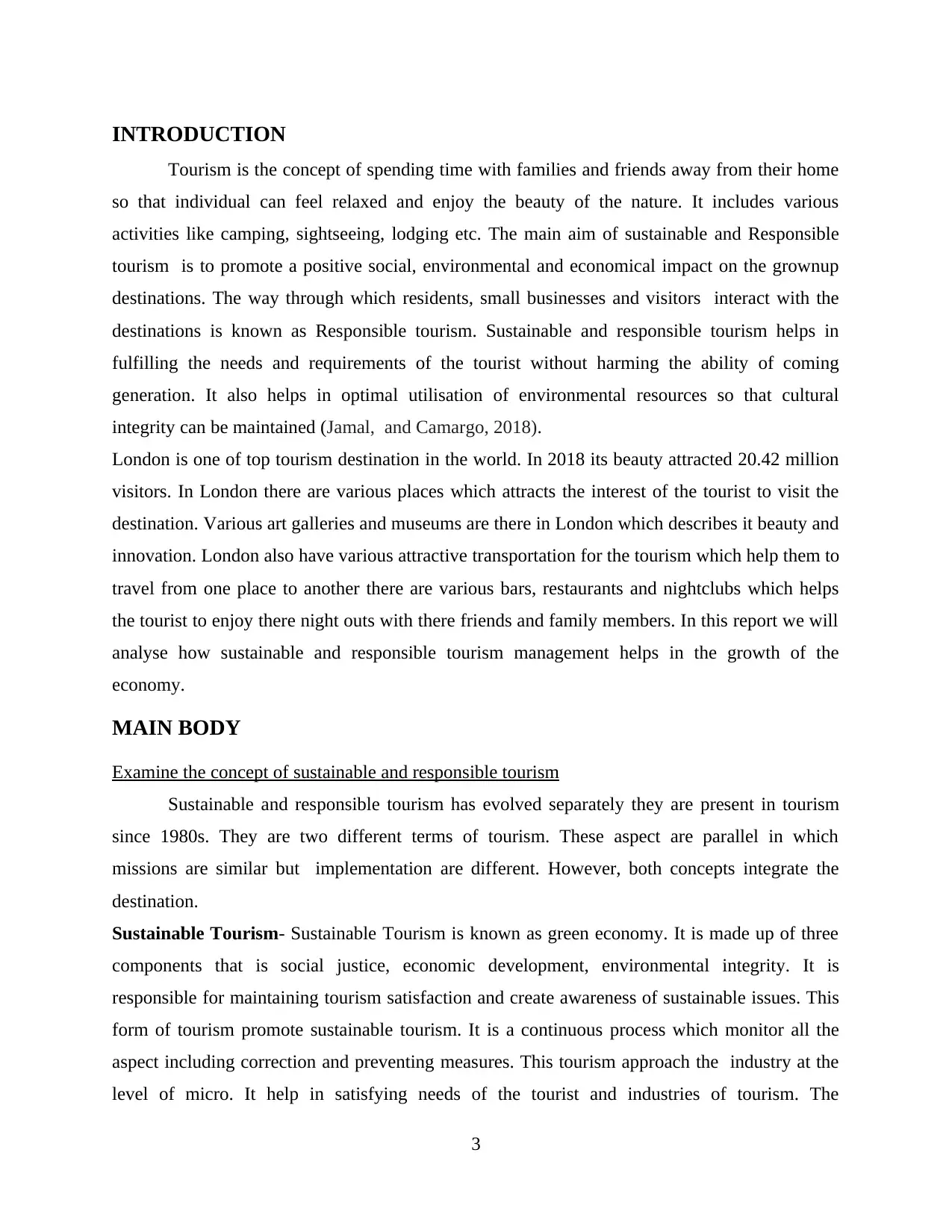
INTRODUCTION
Tourism is the concept of spending time with families and friends away from their home
so that individual can feel relaxed and enjoy the beauty of the nature. It includes various
activities like camping, sightseeing, lodging etc. The main aim of sustainable and Responsible
tourism is to promote a positive social, environmental and economical impact on the grownup
destinations. The way through which residents, small businesses and visitors interact with the
destinations is known as Responsible tourism. Sustainable and responsible tourism helps in
fulfilling the needs and requirements of the tourist without harming the ability of coming
generation. It also helps in optimal utilisation of environmental resources so that cultural
integrity can be maintained (Jamal, and Camargo, 2018).
London is one of top tourism destination in the world. In 2018 its beauty attracted 20.42 million
visitors. In London there are various places which attracts the interest of the tourist to visit the
destination. Various art galleries and museums are there in London which describes it beauty and
innovation. London also have various attractive transportation for the tourism which help them to
travel from one place to another there are various bars, restaurants and nightclubs which helps
the tourist to enjoy there night outs with there friends and family members. In this report we will
analyse how sustainable and responsible tourism management helps in the growth of the
economy.
MAIN BODY
Examine the concept of sustainable and responsible tourism
Sustainable and responsible tourism has evolved separately they are present in tourism
since 1980s. They are two different terms of tourism. These aspect are parallel in which
missions are similar but implementation are different. However, both concepts integrate the
destination.
Sustainable Tourism- Sustainable Tourism is known as green economy. It is made up of three
components that is social justice, economic development, environmental integrity. It is
responsible for maintaining tourism satisfaction and create awareness of sustainable issues. This
form of tourism promote sustainable tourism. It is a continuous process which monitor all the
aspect including correction and preventing measures. This tourism approach the industry at the
level of micro. It help in satisfying needs of the tourist and industries of tourism. The
3
Tourism is the concept of spending time with families and friends away from their home
so that individual can feel relaxed and enjoy the beauty of the nature. It includes various
activities like camping, sightseeing, lodging etc. The main aim of sustainable and Responsible
tourism is to promote a positive social, environmental and economical impact on the grownup
destinations. The way through which residents, small businesses and visitors interact with the
destinations is known as Responsible tourism. Sustainable and responsible tourism helps in
fulfilling the needs and requirements of the tourist without harming the ability of coming
generation. It also helps in optimal utilisation of environmental resources so that cultural
integrity can be maintained (Jamal, and Camargo, 2018).
London is one of top tourism destination in the world. In 2018 its beauty attracted 20.42 million
visitors. In London there are various places which attracts the interest of the tourist to visit the
destination. Various art galleries and museums are there in London which describes it beauty and
innovation. London also have various attractive transportation for the tourism which help them to
travel from one place to another there are various bars, restaurants and nightclubs which helps
the tourist to enjoy there night outs with there friends and family members. In this report we will
analyse how sustainable and responsible tourism management helps in the growth of the
economy.
MAIN BODY
Examine the concept of sustainable and responsible tourism
Sustainable and responsible tourism has evolved separately they are present in tourism
since 1980s. They are two different terms of tourism. These aspect are parallel in which
missions are similar but implementation are different. However, both concepts integrate the
destination.
Sustainable Tourism- Sustainable Tourism is known as green economy. It is made up of three
components that is social justice, economic development, environmental integrity. It is
responsible for maintaining tourism satisfaction and create awareness of sustainable issues. This
form of tourism promote sustainable tourism. It is a continuous process which monitor all the
aspect including correction and preventing measures. This tourism approach the industry at the
level of micro. It help in satisfying needs of the tourist and industries of tourism. The
3
⊘ This is a preview!⊘
Do you want full access?
Subscribe today to unlock all pages.

Trusted by 1+ million students worldwide
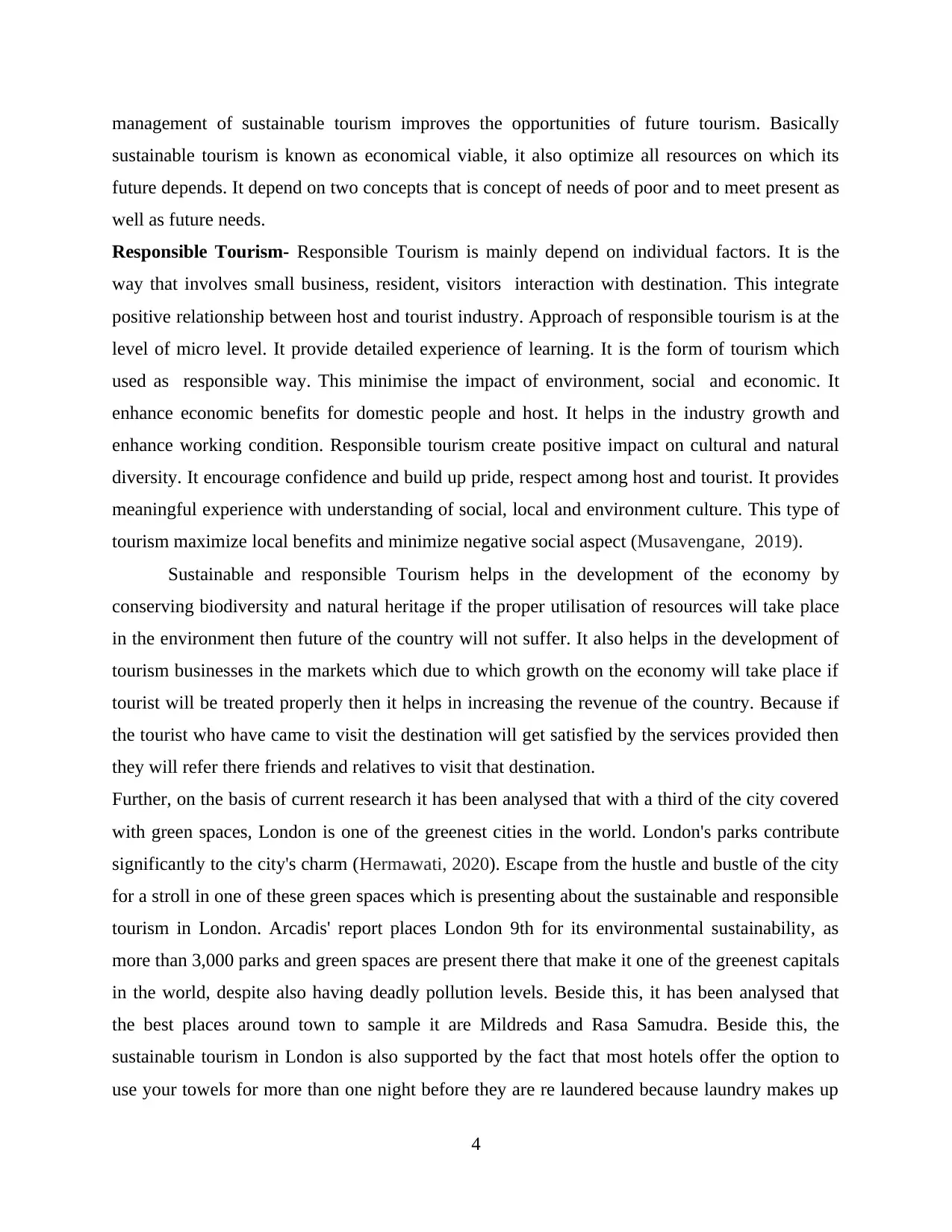
management of sustainable tourism improves the opportunities of future tourism. Basically
sustainable tourism is known as economical viable, it also optimize all resources on which its
future depends. It depend on two concepts that is concept of needs of poor and to meet present as
well as future needs.
Responsible Tourism- Responsible Tourism is mainly depend on individual factors. It is the
way that involves small business, resident, visitors interaction with destination. This integrate
positive relationship between host and tourist industry. Approach of responsible tourism is at the
level of micro level. It provide detailed experience of learning. It is the form of tourism which
used as responsible way. This minimise the impact of environment, social and economic. It
enhance economic benefits for domestic people and host. It helps in the industry growth and
enhance working condition. Responsible tourism create positive impact on cultural and natural
diversity. It encourage confidence and build up pride, respect among host and tourist. It provides
meaningful experience with understanding of social, local and environment culture. This type of
tourism maximize local benefits and minimize negative social aspect (Musavengane, 2019).
Sustainable and responsible Tourism helps in the development of the economy by
conserving biodiversity and natural heritage if the proper utilisation of resources will take place
in the environment then future of the country will not suffer. It also helps in the development of
tourism businesses in the markets which due to which growth on the economy will take place if
tourist will be treated properly then it helps in increasing the revenue of the country. Because if
the tourist who have came to visit the destination will get satisfied by the services provided then
they will refer there friends and relatives to visit that destination.
Further, on the basis of current research it has been analysed that with a third of the city covered
with green spaces, London is one of the greenest cities in the world. London's parks contribute
significantly to the city's charm (Hermawati, 2020). Escape from the hustle and bustle of the city
for a stroll in one of these green spaces which is presenting about the sustainable and responsible
tourism in London. Arcadis' report places London 9th for its environmental sustainability, as
more than 3,000 parks and green spaces are present there that make it one of the greenest capitals
in the world, despite also having deadly pollution levels. Beside this, it has been analysed that
the best places around town to sample it are Mildreds and Rasa Samudra. Beside this, the
sustainable tourism in London is also supported by the fact that most hotels offer the option to
use your towels for more than one night before they are re laundered because laundry makes up
4
sustainable tourism is known as economical viable, it also optimize all resources on which its
future depends. It depend on two concepts that is concept of needs of poor and to meet present as
well as future needs.
Responsible Tourism- Responsible Tourism is mainly depend on individual factors. It is the
way that involves small business, resident, visitors interaction with destination. This integrate
positive relationship between host and tourist industry. Approach of responsible tourism is at the
level of micro level. It provide detailed experience of learning. It is the form of tourism which
used as responsible way. This minimise the impact of environment, social and economic. It
enhance economic benefits for domestic people and host. It helps in the industry growth and
enhance working condition. Responsible tourism create positive impact on cultural and natural
diversity. It encourage confidence and build up pride, respect among host and tourist. It provides
meaningful experience with understanding of social, local and environment culture. This type of
tourism maximize local benefits and minimize negative social aspect (Musavengane, 2019).
Sustainable and responsible Tourism helps in the development of the economy by
conserving biodiversity and natural heritage if the proper utilisation of resources will take place
in the environment then future of the country will not suffer. It also helps in the development of
tourism businesses in the markets which due to which growth on the economy will take place if
tourist will be treated properly then it helps in increasing the revenue of the country. Because if
the tourist who have came to visit the destination will get satisfied by the services provided then
they will refer there friends and relatives to visit that destination.
Further, on the basis of current research it has been analysed that with a third of the city covered
with green spaces, London is one of the greenest cities in the world. London's parks contribute
significantly to the city's charm (Hermawati, 2020). Escape from the hustle and bustle of the city
for a stroll in one of these green spaces which is presenting about the sustainable and responsible
tourism in London. Arcadis' report places London 9th for its environmental sustainability, as
more than 3,000 parks and green spaces are present there that make it one of the greenest capitals
in the world, despite also having deadly pollution levels. Beside this, it has been analysed that
the best places around town to sample it are Mildreds and Rasa Samudra. Beside this, the
sustainable tourism in London is also supported by the fact that most hotels offer the option to
use your towels for more than one night before they are re laundered because laundry makes up
4
Paraphrase This Document
Need a fresh take? Get an instant paraphrase of this document with our AI Paraphraser
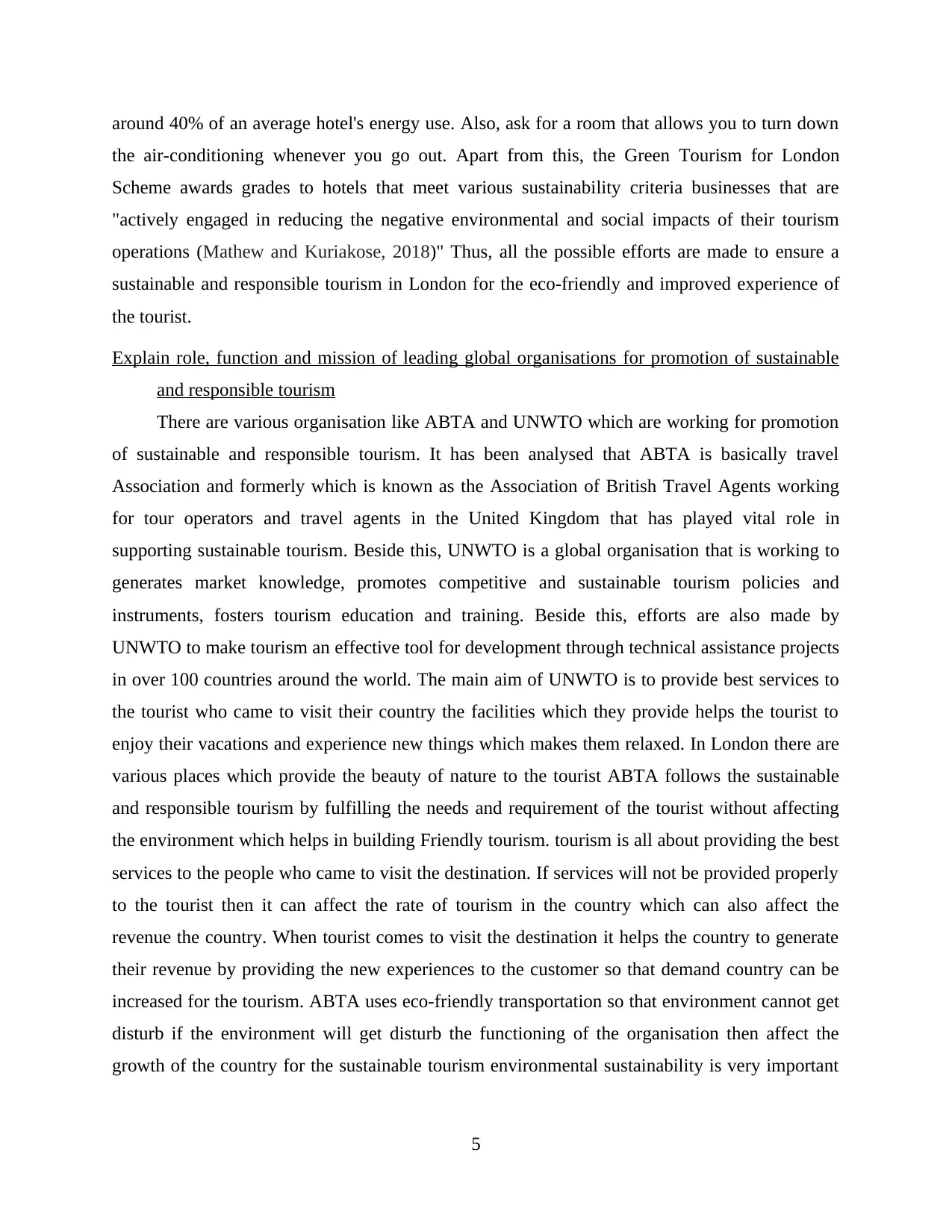
around 40% of an average hotel's energy use. Also, ask for a room that allows you to turn down
the air-conditioning whenever you go out. Apart from this, the Green Tourism for London
Scheme awards grades to hotels that meet various sustainability criteria businesses that are
"actively engaged in reducing the negative environmental and social impacts of their tourism
operations (Mathew and Kuriakose, 2018)" Thus, all the possible efforts are made to ensure a
sustainable and responsible tourism in London for the eco-friendly and improved experience of
the tourist.
Explain role, function and mission of leading global organisations for promotion of sustainable
and responsible tourism
There are various organisation like ABTA and UNWTO which are working for promotion
of sustainable and responsible tourism. It has been analysed that ABTA is basically travel
Association and formerly which is known as the Association of British Travel Agents working
for tour operators and travel agents in the United Kingdom that has played vital role in
supporting sustainable tourism. Beside this, UNWTO is a global organisation that is working to
generates market knowledge, promotes competitive and sustainable tourism policies and
instruments, fosters tourism education and training. Beside this, efforts are also made by
UNWTO to make tourism an effective tool for development through technical assistance projects
in over 100 countries around the world. The main aim of UNWTO is to provide best services to
the tourist who came to visit their country the facilities which they provide helps the tourist to
enjoy their vacations and experience new things which makes them relaxed. In London there are
various places which provide the beauty of nature to the tourist ABTA follows the sustainable
and responsible tourism by fulfilling the needs and requirement of the tourist without affecting
the environment which helps in building Friendly tourism. tourism is all about providing the best
services to the people who came to visit the destination. If services will not be provided properly
to the tourist then it can affect the rate of tourism in the country which can also affect the
revenue the country. When tourist comes to visit the destination it helps the country to generate
their revenue by providing the new experiences to the customer so that demand country can be
increased for the tourism. ABTA uses eco-friendly transportation so that environment cannot get
disturb if the environment will get disturb the functioning of the organisation then affect the
growth of the country for the sustainable tourism environmental sustainability is very important
5
the air-conditioning whenever you go out. Apart from this, the Green Tourism for London
Scheme awards grades to hotels that meet various sustainability criteria businesses that are
"actively engaged in reducing the negative environmental and social impacts of their tourism
operations (Mathew and Kuriakose, 2018)" Thus, all the possible efforts are made to ensure a
sustainable and responsible tourism in London for the eco-friendly and improved experience of
the tourist.
Explain role, function and mission of leading global organisations for promotion of sustainable
and responsible tourism
There are various organisation like ABTA and UNWTO which are working for promotion
of sustainable and responsible tourism. It has been analysed that ABTA is basically travel
Association and formerly which is known as the Association of British Travel Agents working
for tour operators and travel agents in the United Kingdom that has played vital role in
supporting sustainable tourism. Beside this, UNWTO is a global organisation that is working to
generates market knowledge, promotes competitive and sustainable tourism policies and
instruments, fosters tourism education and training. Beside this, efforts are also made by
UNWTO to make tourism an effective tool for development through technical assistance projects
in over 100 countries around the world. The main aim of UNWTO is to provide best services to
the tourist who came to visit their country the facilities which they provide helps the tourist to
enjoy their vacations and experience new things which makes them relaxed. In London there are
various places which provide the beauty of nature to the tourist ABTA follows the sustainable
and responsible tourism by fulfilling the needs and requirement of the tourist without affecting
the environment which helps in building Friendly tourism. tourism is all about providing the best
services to the people who came to visit the destination. If services will not be provided properly
to the tourist then it can affect the rate of tourism in the country which can also affect the
revenue the country. When tourist comes to visit the destination it helps the country to generate
their revenue by providing the new experiences to the customer so that demand country can be
increased for the tourism. ABTA uses eco-friendly transportation so that environment cannot get
disturb if the environment will get disturb the functioning of the organisation then affect the
growth of the country for the sustainable tourism environmental sustainability is very important
5
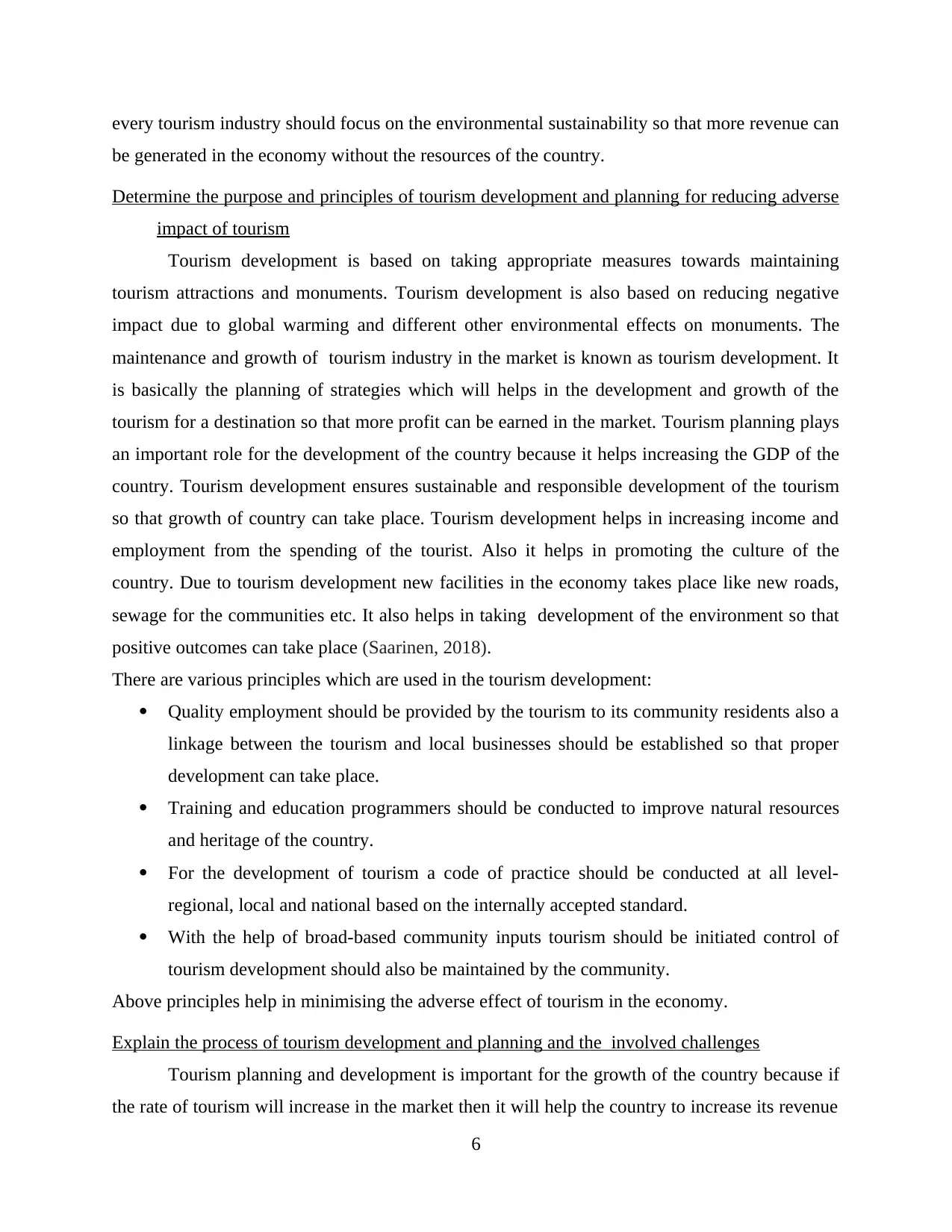
every tourism industry should focus on the environmental sustainability so that more revenue can
be generated in the economy without the resources of the country.
Determine the purpose and principles of tourism development and planning for reducing adverse
impact of tourism
Tourism development is based on taking appropriate measures towards maintaining
tourism attractions and monuments. Tourism development is also based on reducing negative
impact due to global warming and different other environmental effects on monuments. The
maintenance and growth of tourism industry in the market is known as tourism development. It
is basically the planning of strategies which will helps in the development and growth of the
tourism for a destination so that more profit can be earned in the market. Tourism planning plays
an important role for the development of the country because it helps increasing the GDP of the
country. Tourism development ensures sustainable and responsible development of the tourism
so that growth of country can take place. Tourism development helps in increasing income and
employment from the spending of the tourist. Also it helps in promoting the culture of the
country. Due to tourism development new facilities in the economy takes place like new roads,
sewage for the communities etc. It also helps in taking development of the environment so that
positive outcomes can take place (Saarinen, 2018).
There are various principles which are used in the tourism development:
Quality employment should be provided by the tourism to its community residents also a
linkage between the tourism and local businesses should be established so that proper
development can take place.
Training and education programmers should be conducted to improve natural resources
and heritage of the country.
For the development of tourism a code of practice should be conducted at all level-
regional, local and national based on the internally accepted standard.
With the help of broad-based community inputs tourism should be initiated control of
tourism development should also be maintained by the community.
Above principles help in minimising the adverse effect of tourism in the economy.
Explain the process of tourism development and planning and the involved challenges
Tourism planning and development is important for the growth of the country because if
the rate of tourism will increase in the market then it will help the country to increase its revenue
6
be generated in the economy without the resources of the country.
Determine the purpose and principles of tourism development and planning for reducing adverse
impact of tourism
Tourism development is based on taking appropriate measures towards maintaining
tourism attractions and monuments. Tourism development is also based on reducing negative
impact due to global warming and different other environmental effects on monuments. The
maintenance and growth of tourism industry in the market is known as tourism development. It
is basically the planning of strategies which will helps in the development and growth of the
tourism for a destination so that more profit can be earned in the market. Tourism planning plays
an important role for the development of the country because it helps increasing the GDP of the
country. Tourism development ensures sustainable and responsible development of the tourism
so that growth of country can take place. Tourism development helps in increasing income and
employment from the spending of the tourist. Also it helps in promoting the culture of the
country. Due to tourism development new facilities in the economy takes place like new roads,
sewage for the communities etc. It also helps in taking development of the environment so that
positive outcomes can take place (Saarinen, 2018).
There are various principles which are used in the tourism development:
Quality employment should be provided by the tourism to its community residents also a
linkage between the tourism and local businesses should be established so that proper
development can take place.
Training and education programmers should be conducted to improve natural resources
and heritage of the country.
For the development of tourism a code of practice should be conducted at all level-
regional, local and national based on the internally accepted standard.
With the help of broad-based community inputs tourism should be initiated control of
tourism development should also be maintained by the community.
Above principles help in minimising the adverse effect of tourism in the economy.
Explain the process of tourism development and planning and the involved challenges
Tourism planning and development is important for the growth of the country because if
the rate of tourism will increase in the market then it will help the country to increase its revenue
6
⊘ This is a preview!⊘
Do you want full access?
Subscribe today to unlock all pages.

Trusted by 1+ million students worldwide
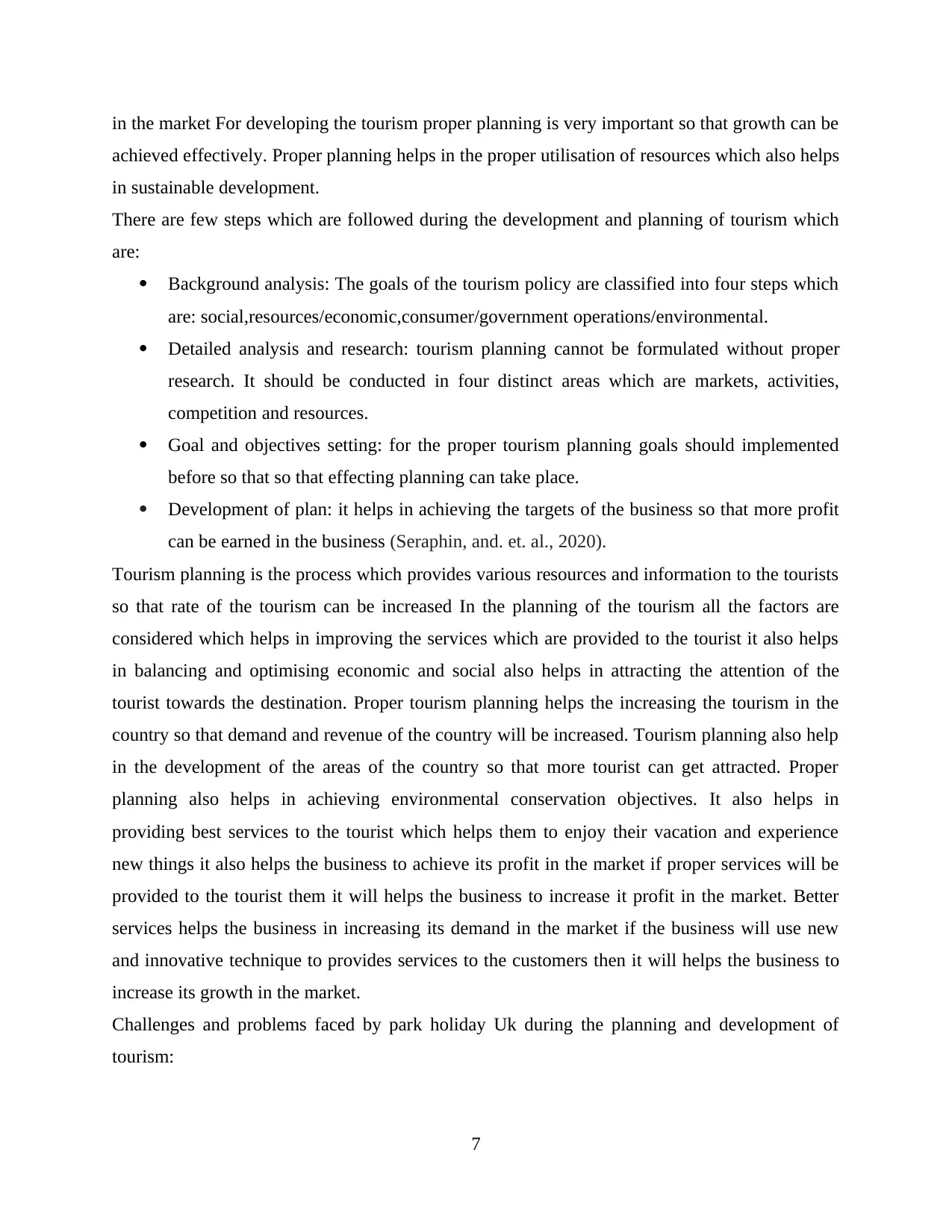
in the market For developing the tourism proper planning is very important so that growth can be
achieved effectively. Proper planning helps in the proper utilisation of resources which also helps
in sustainable development.
There are few steps which are followed during the development and planning of tourism which
are:
Background analysis: The goals of the tourism policy are classified into four steps which
are: social,resources/economic,consumer/government operations/environmental.
Detailed analysis and research: tourism planning cannot be formulated without proper
research. It should be conducted in four distinct areas which are markets, activities,
competition and resources.
Goal and objectives setting: for the proper tourism planning goals should implemented
before so that so that effecting planning can take place.
Development of plan: it helps in achieving the targets of the business so that more profit
can be earned in the business (Seraphin, and. et. al., 2020).
Tourism planning is the process which provides various resources and information to the tourists
so that rate of the tourism can be increased In the planning of the tourism all the factors are
considered which helps in improving the services which are provided to the tourist it also helps
in balancing and optimising economic and social also helps in attracting the attention of the
tourist towards the destination. Proper tourism planning helps the increasing the tourism in the
country so that demand and revenue of the country will be increased. Tourism planning also help
in the development of the areas of the country so that more tourist can get attracted. Proper
planning also helps in achieving environmental conservation objectives. It also helps in
providing best services to the tourist which helps them to enjoy their vacation and experience
new things it also helps the business to achieve its profit in the market if proper services will be
provided to the tourist them it will helps the business to increase it profit in the market. Better
services helps the business in increasing its demand in the market if the business will use new
and innovative technique to provides services to the customers then it will helps the business to
increase its growth in the market.
Challenges and problems faced by park holiday Uk during the planning and development of
tourism:
7
achieved effectively. Proper planning helps in the proper utilisation of resources which also helps
in sustainable development.
There are few steps which are followed during the development and planning of tourism which
are:
Background analysis: The goals of the tourism policy are classified into four steps which
are: social,resources/economic,consumer/government operations/environmental.
Detailed analysis and research: tourism planning cannot be formulated without proper
research. It should be conducted in four distinct areas which are markets, activities,
competition and resources.
Goal and objectives setting: for the proper tourism planning goals should implemented
before so that so that effecting planning can take place.
Development of plan: it helps in achieving the targets of the business so that more profit
can be earned in the business (Seraphin, and. et. al., 2020).
Tourism planning is the process which provides various resources and information to the tourists
so that rate of the tourism can be increased In the planning of the tourism all the factors are
considered which helps in improving the services which are provided to the tourist it also helps
in balancing and optimising economic and social also helps in attracting the attention of the
tourist towards the destination. Proper tourism planning helps the increasing the tourism in the
country so that demand and revenue of the country will be increased. Tourism planning also help
in the development of the areas of the country so that more tourist can get attracted. Proper
planning also helps in achieving environmental conservation objectives. It also helps in
providing best services to the tourist which helps them to enjoy their vacation and experience
new things it also helps the business to achieve its profit in the market if proper services will be
provided to the tourist them it will helps the business to increase it profit in the market. Better
services helps the business in increasing its demand in the market if the business will use new
and innovative technique to provides services to the customers then it will helps the business to
increase its growth in the market.
Challenges and problems faced by park holiday Uk during the planning and development of
tourism:
7
Paraphrase This Document
Need a fresh take? Get an instant paraphrase of this document with our AI Paraphraser
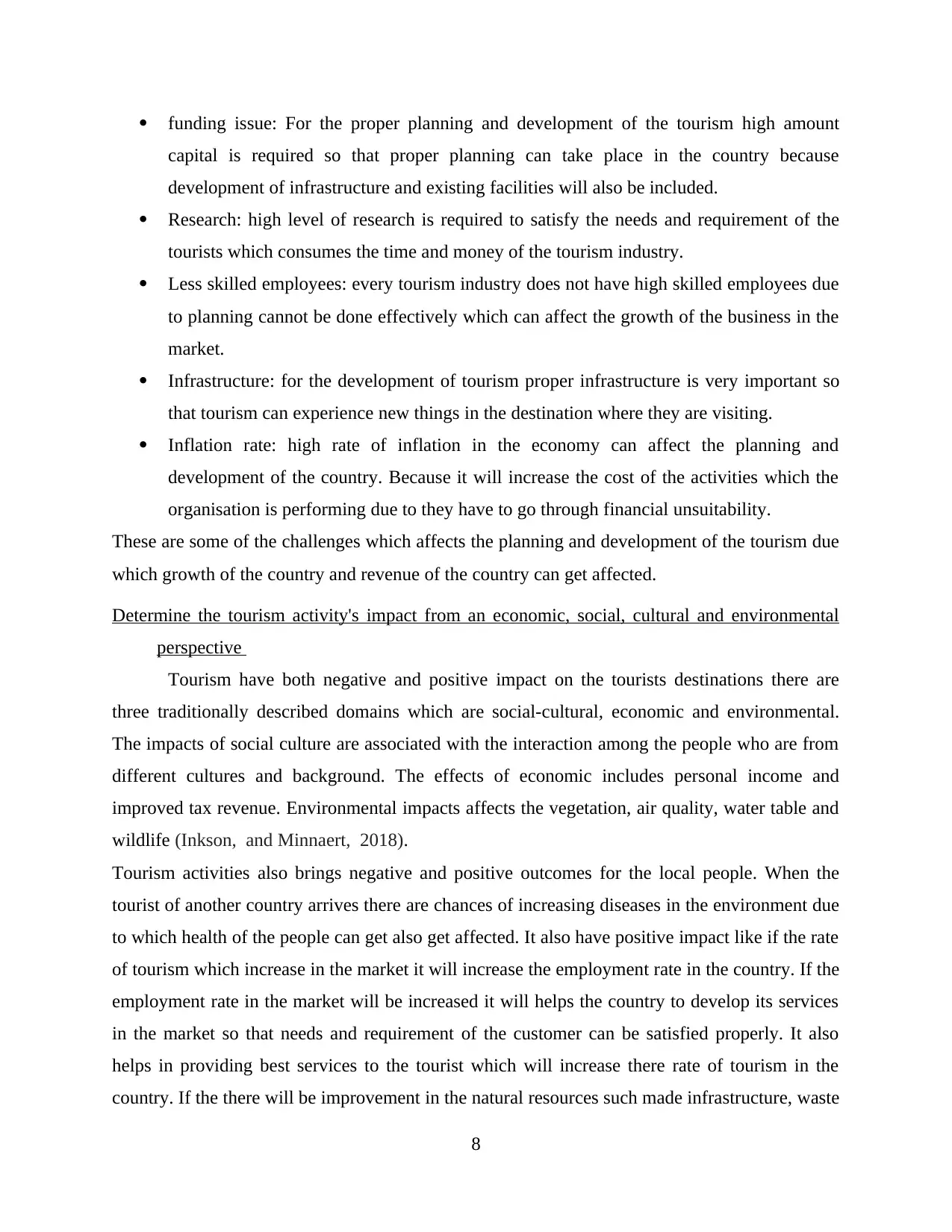
funding issue: For the proper planning and development of the tourism high amount
capital is required so that proper planning can take place in the country because
development of infrastructure and existing facilities will also be included.
Research: high level of research is required to satisfy the needs and requirement of the
tourists which consumes the time and money of the tourism industry.
Less skilled employees: every tourism industry does not have high skilled employees due
to planning cannot be done effectively which can affect the growth of the business in the
market.
Infrastructure: for the development of tourism proper infrastructure is very important so
that tourism can experience new things in the destination where they are visiting.
Inflation rate: high rate of inflation in the economy can affect the planning and
development of the country. Because it will increase the cost of the activities which the
organisation is performing due to they have to go through financial unsuitability.
These are some of the challenges which affects the planning and development of the tourism due
which growth of the country and revenue of the country can get affected.
Determine the tourism activity's impact from an economic, social, cultural and environmental
perspective
Tourism have both negative and positive impact on the tourists destinations there are
three traditionally described domains which are social-cultural, economic and environmental.
The impacts of social culture are associated with the interaction among the people who are from
different cultures and background. The effects of economic includes personal income and
improved tax revenue. Environmental impacts affects the vegetation, air quality, water table and
wildlife (Inkson, and Minnaert, 2018).
Tourism activities also brings negative and positive outcomes for the local people. When the
tourist of another country arrives there are chances of increasing diseases in the environment due
to which health of the people can get also get affected. It also have positive impact like if the rate
of tourism which increase in the market it will increase the employment rate in the country. If the
employment rate in the market will be increased it will helps the country to develop its services
in the market so that needs and requirement of the customer can be satisfied properly. It also
helps in providing best services to the tourist which will increase there rate of tourism in the
country. If the there will be improvement in the natural resources such made infrastructure, waste
8
capital is required so that proper planning can take place in the country because
development of infrastructure and existing facilities will also be included.
Research: high level of research is required to satisfy the needs and requirement of the
tourists which consumes the time and money of the tourism industry.
Less skilled employees: every tourism industry does not have high skilled employees due
to planning cannot be done effectively which can affect the growth of the business in the
market.
Infrastructure: for the development of tourism proper infrastructure is very important so
that tourism can experience new things in the destination where they are visiting.
Inflation rate: high rate of inflation in the economy can affect the planning and
development of the country. Because it will increase the cost of the activities which the
organisation is performing due to they have to go through financial unsuitability.
These are some of the challenges which affects the planning and development of the tourism due
which growth of the country and revenue of the country can get affected.
Determine the tourism activity's impact from an economic, social, cultural and environmental
perspective
Tourism have both negative and positive impact on the tourists destinations there are
three traditionally described domains which are social-cultural, economic and environmental.
The impacts of social culture are associated with the interaction among the people who are from
different cultures and background. The effects of economic includes personal income and
improved tax revenue. Environmental impacts affects the vegetation, air quality, water table and
wildlife (Inkson, and Minnaert, 2018).
Tourism activities also brings negative and positive outcomes for the local people. When the
tourist of another country arrives there are chances of increasing diseases in the environment due
to which health of the people can get also get affected. It also have positive impact like if the rate
of tourism which increase in the market it will increase the employment rate in the country. If the
employment rate in the market will be increased it will helps the country to develop its services
in the market so that needs and requirement of the customer can be satisfied properly. It also
helps in providing best services to the tourist which will increase there rate of tourism in the
country. If the there will be improvement in the natural resources such made infrastructure, waste
8
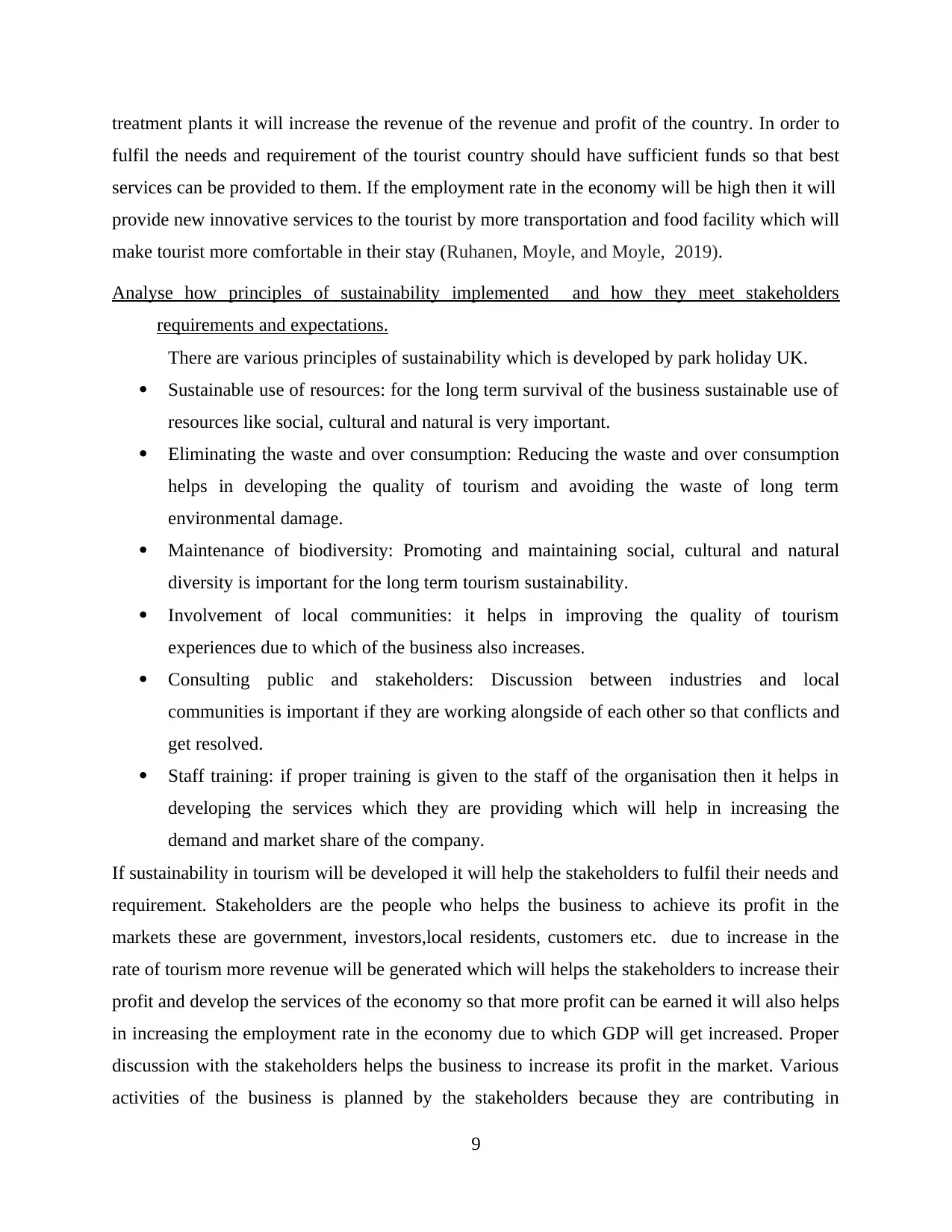
treatment plants it will increase the revenue of the revenue and profit of the country. In order to
fulfil the needs and requirement of the tourist country should have sufficient funds so that best
services can be provided to them. If the employment rate in the economy will be high then it will
provide new innovative services to the tourist by more transportation and food facility which will
make tourist more comfortable in their stay (Ruhanen, Moyle, and Moyle, 2019).
Analyse how principles of sustainability implemented and how they meet stakeholders
requirements and expectations.
There are various principles of sustainability which is developed by park holiday UK.
Sustainable use of resources: for the long term survival of the business sustainable use of
resources like social, cultural and natural is very important.
Eliminating the waste and over consumption: Reducing the waste and over consumption
helps in developing the quality of tourism and avoiding the waste of long term
environmental damage.
Maintenance of biodiversity: Promoting and maintaining social, cultural and natural
diversity is important for the long term tourism sustainability.
Involvement of local communities: it helps in improving the quality of tourism
experiences due to which of the business also increases.
Consulting public and stakeholders: Discussion between industries and local
communities is important if they are working alongside of each other so that conflicts and
get resolved.
Staff training: if proper training is given to the staff of the organisation then it helps in
developing the services which they are providing which will help in increasing the
demand and market share of the company.
If sustainability in tourism will be developed it will help the stakeholders to fulfil their needs and
requirement. Stakeholders are the people who helps the business to achieve its profit in the
markets these are government, investors,local residents, customers etc. due to increase in the
rate of tourism more revenue will be generated which will helps the stakeholders to increase their
profit and develop the services of the economy so that more profit can be earned it will also helps
in increasing the employment rate in the economy due to which GDP will get increased. Proper
discussion with the stakeholders helps the business to increase its profit in the market. Various
activities of the business is planned by the stakeholders because they are contributing in
9
fulfil the needs and requirement of the tourist country should have sufficient funds so that best
services can be provided to them. If the employment rate in the economy will be high then it will
provide new innovative services to the tourist by more transportation and food facility which will
make tourist more comfortable in their stay (Ruhanen, Moyle, and Moyle, 2019).
Analyse how principles of sustainability implemented and how they meet stakeholders
requirements and expectations.
There are various principles of sustainability which is developed by park holiday UK.
Sustainable use of resources: for the long term survival of the business sustainable use of
resources like social, cultural and natural is very important.
Eliminating the waste and over consumption: Reducing the waste and over consumption
helps in developing the quality of tourism and avoiding the waste of long term
environmental damage.
Maintenance of biodiversity: Promoting and maintaining social, cultural and natural
diversity is important for the long term tourism sustainability.
Involvement of local communities: it helps in improving the quality of tourism
experiences due to which of the business also increases.
Consulting public and stakeholders: Discussion between industries and local
communities is important if they are working alongside of each other so that conflicts and
get resolved.
Staff training: if proper training is given to the staff of the organisation then it helps in
developing the services which they are providing which will help in increasing the
demand and market share of the company.
If sustainability in tourism will be developed it will help the stakeholders to fulfil their needs and
requirement. Stakeholders are the people who helps the business to achieve its profit in the
markets these are government, investors,local residents, customers etc. due to increase in the
rate of tourism more revenue will be generated which will helps the stakeholders to increase their
profit and develop the services of the economy so that more profit can be earned it will also helps
in increasing the employment rate in the economy due to which GDP will get increased. Proper
discussion with the stakeholders helps the business to increase its profit in the market. Various
activities of the business is planned by the stakeholders because they are contributing in
9
⊘ This is a preview!⊘
Do you want full access?
Subscribe today to unlock all pages.

Trusted by 1+ million students worldwide
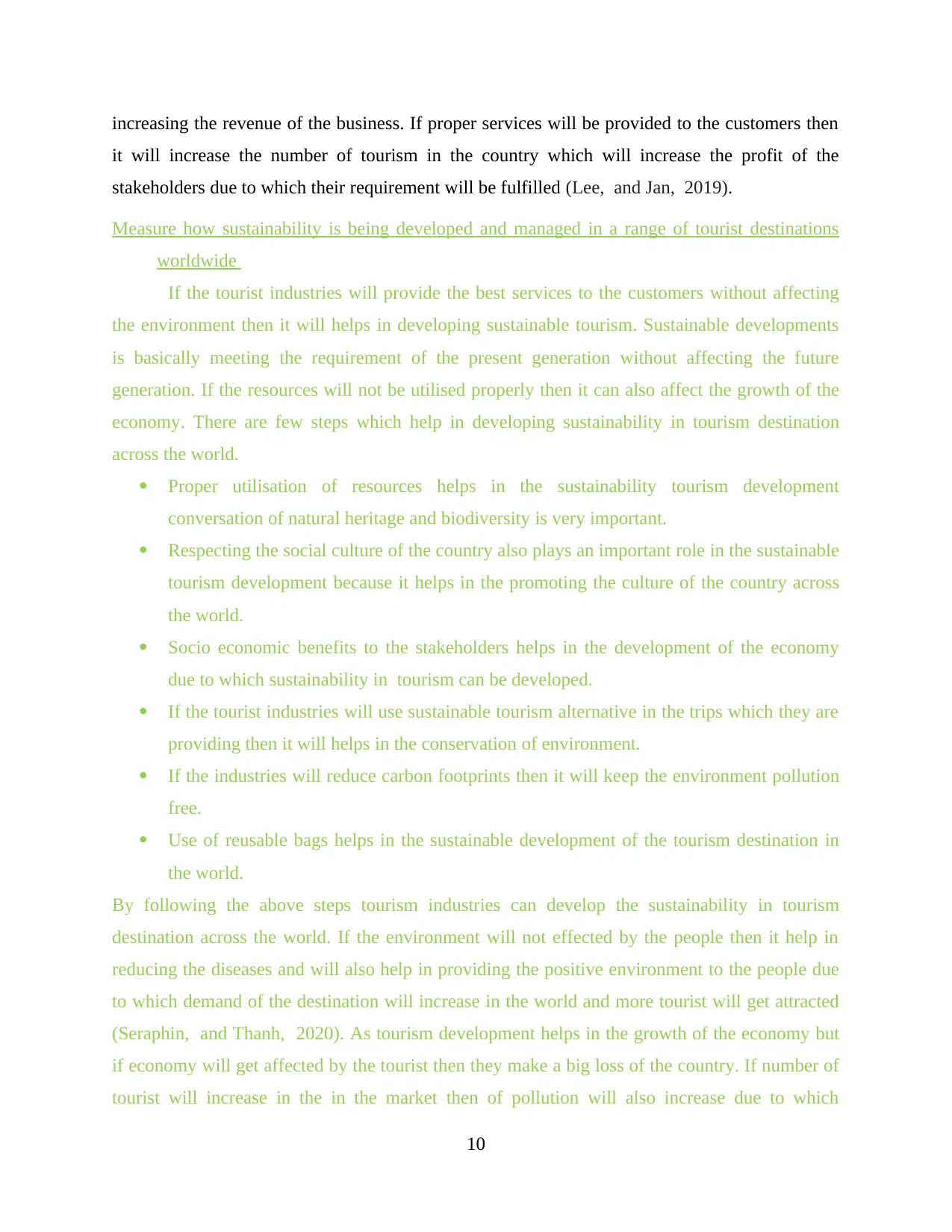
increasing the revenue of the business. If proper services will be provided to the customers then
it will increase the number of tourism in the country which will increase the profit of the
stakeholders due to which their requirement will be fulfilled (Lee, and Jan, 2019).
Measure how sustainability is being developed and managed in a range of tourist destinations
worldwide
If the tourist industries will provide the best services to the customers without affecting
the environment then it will helps in developing sustainable tourism. Sustainable developments
is basically meeting the requirement of the present generation without affecting the future
generation. If the resources will not be utilised properly then it can also affect the growth of the
economy. There are few steps which help in developing sustainability in tourism destination
across the world.
Proper utilisation of resources helps in the sustainability tourism development
conversation of natural heritage and biodiversity is very important.
Respecting the social culture of the country also plays an important role in the sustainable
tourism development because it helps in the promoting the culture of the country across
the world.
Socio economic benefits to the stakeholders helps in the development of the economy
due to which sustainability in tourism can be developed.
If the tourist industries will use sustainable tourism alternative in the trips which they are
providing then it will helps in the conservation of environment.
If the industries will reduce carbon footprints then it will keep the environment pollution
free.
Use of reusable bags helps in the sustainable development of the tourism destination in
the world.
By following the above steps tourism industries can develop the sustainability in tourism
destination across the world. If the environment will not effected by the people then it help in
reducing the diseases and will also help in providing the positive environment to the people due
to which demand of the destination will increase in the world and more tourist will get attracted
(Seraphin, and Thanh, 2020). As tourism development helps in the growth of the economy but
if economy will get affected by the tourist then they make a big loss of the country. If number of
tourist will increase in the in the market then of pollution will also increase due to which
10
it will increase the number of tourism in the country which will increase the profit of the
stakeholders due to which their requirement will be fulfilled (Lee, and Jan, 2019).
Measure how sustainability is being developed and managed in a range of tourist destinations
worldwide
If the tourist industries will provide the best services to the customers without affecting
the environment then it will helps in developing sustainable tourism. Sustainable developments
is basically meeting the requirement of the present generation without affecting the future
generation. If the resources will not be utilised properly then it can also affect the growth of the
economy. There are few steps which help in developing sustainability in tourism destination
across the world.
Proper utilisation of resources helps in the sustainability tourism development
conversation of natural heritage and biodiversity is very important.
Respecting the social culture of the country also plays an important role in the sustainable
tourism development because it helps in the promoting the culture of the country across
the world.
Socio economic benefits to the stakeholders helps in the development of the economy
due to which sustainability in tourism can be developed.
If the tourist industries will use sustainable tourism alternative in the trips which they are
providing then it will helps in the conservation of environment.
If the industries will reduce carbon footprints then it will keep the environment pollution
free.
Use of reusable bags helps in the sustainable development of the tourism destination in
the world.
By following the above steps tourism industries can develop the sustainability in tourism
destination across the world. If the environment will not effected by the people then it help in
reducing the diseases and will also help in providing the positive environment to the people due
to which demand of the destination will increase in the world and more tourist will get attracted
(Seraphin, and Thanh, 2020). As tourism development helps in the growth of the economy but
if economy will get affected by the tourist then they make a big loss of the country. If number of
tourist will increase in the in the market then of pollution will also increase due to which
10
Paraphrase This Document
Need a fresh take? Get an instant paraphrase of this document with our AI Paraphraser
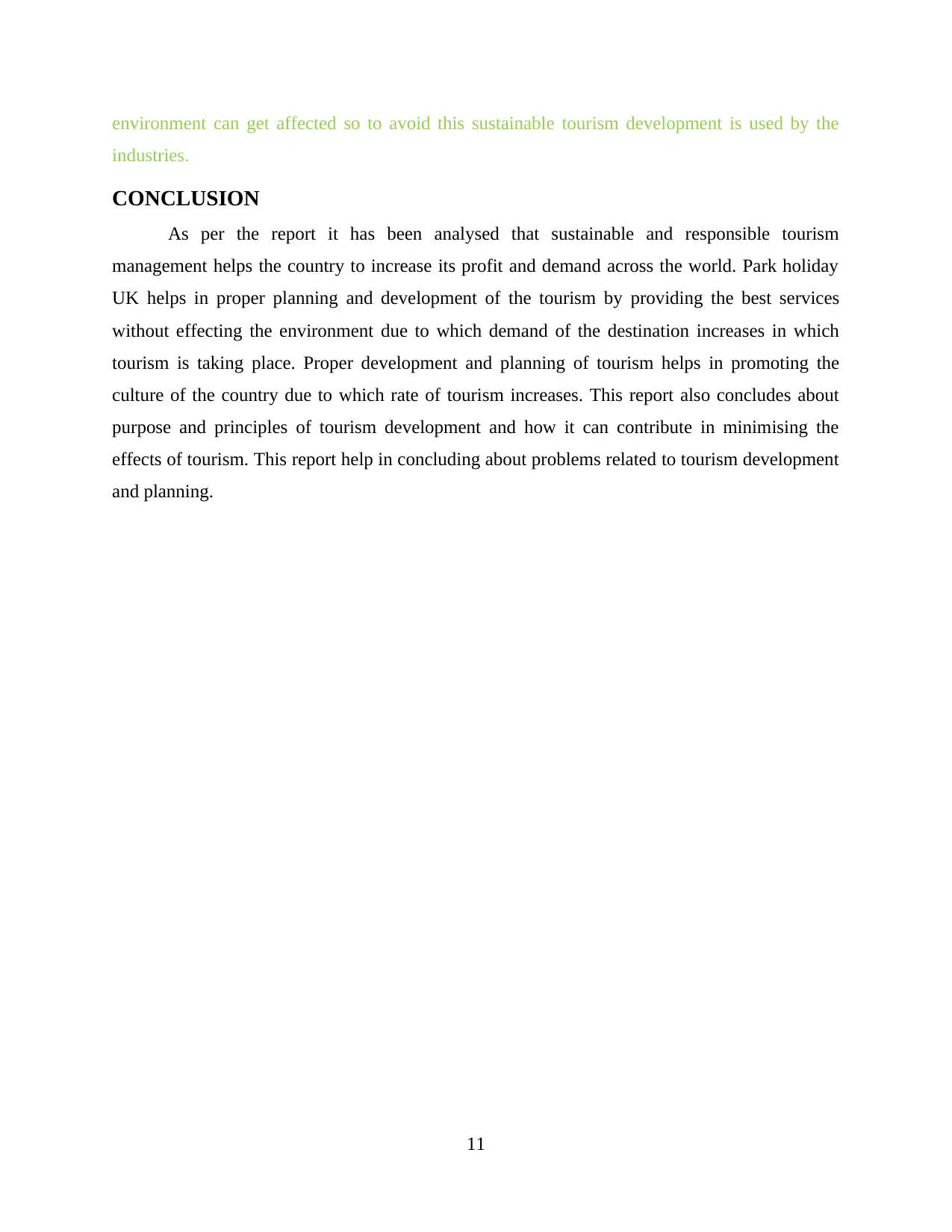
environment can get affected so to avoid this sustainable tourism development is used by the
industries.
CONCLUSION
As per the report it has been analysed that sustainable and responsible tourism
management helps the country to increase its profit and demand across the world. Park holiday
UK helps in proper planning and development of the tourism by providing the best services
without effecting the environment due to which demand of the destination increases in which
tourism is taking place. Proper development and planning of tourism helps in promoting the
culture of the country due to which rate of tourism increases. This report also concludes about
purpose and principles of tourism development and how it can contribute in minimising the
effects of tourism. This report help in concluding about problems related to tourism development
and planning.
11
industries.
CONCLUSION
As per the report it has been analysed that sustainable and responsible tourism
management helps the country to increase its profit and demand across the world. Park holiday
UK helps in proper planning and development of the tourism by providing the best services
without effecting the environment due to which demand of the destination increases in which
tourism is taking place. Proper development and planning of tourism helps in promoting the
culture of the country due to which rate of tourism increases. This report also concludes about
purpose and principles of tourism development and how it can contribute in minimising the
effects of tourism. This report help in concluding about problems related to tourism development
and planning.
11
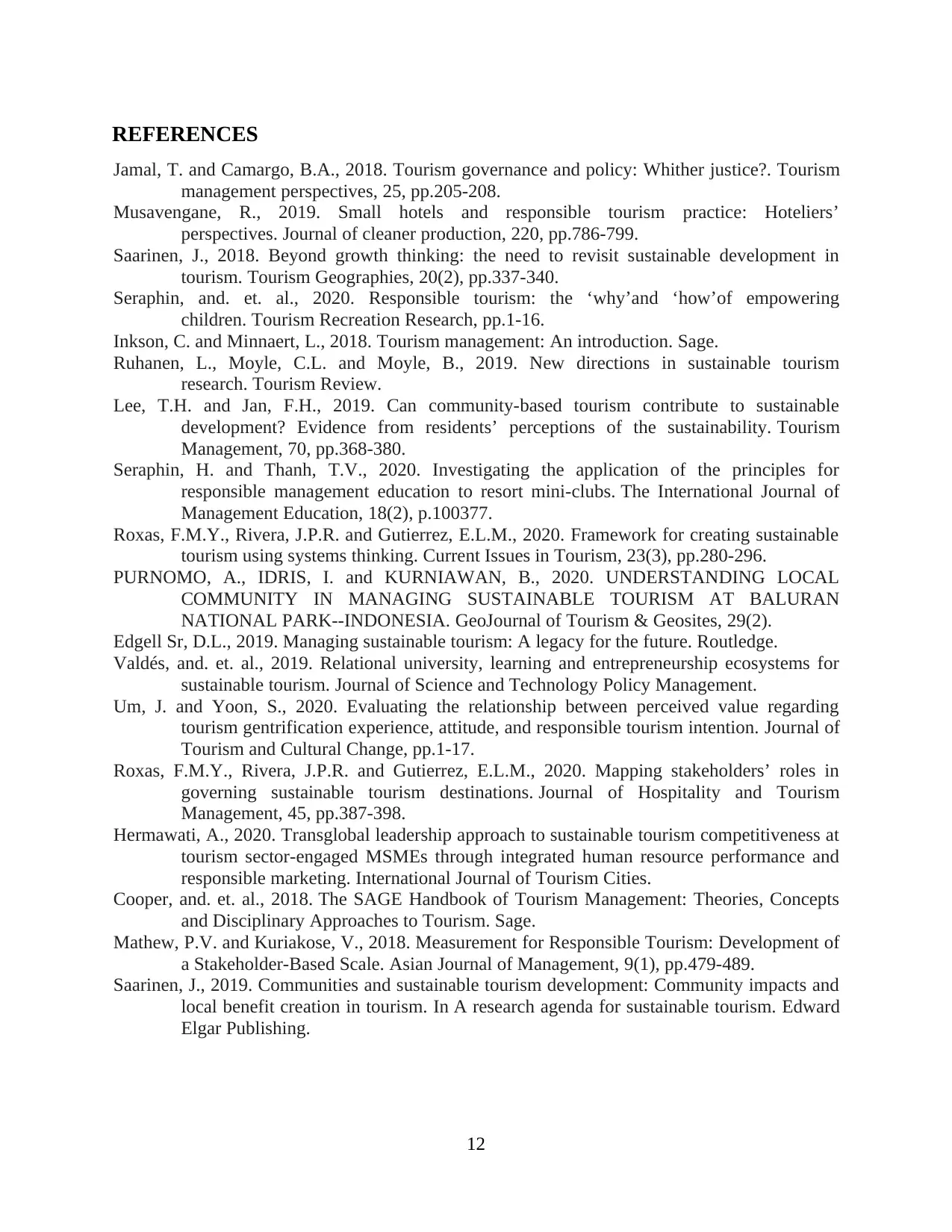
REFERENCES
Jamal, T. and Camargo, B.A., 2018. Tourism governance and policy: Whither justice?. Tourism
management perspectives, 25, pp.205-208.
Musavengane, R., 2019. Small hotels and responsible tourism practice: Hoteliers’
perspectives. Journal of cleaner production, 220, pp.786-799.
Saarinen, J., 2018. Beyond growth thinking: the need to revisit sustainable development in
tourism. Tourism Geographies, 20(2), pp.337-340.
Seraphin, and. et. al., 2020. Responsible tourism: the ‘why’and ‘how’of empowering
children. Tourism Recreation Research, pp.1-16.
Inkson, C. and Minnaert, L., 2018. Tourism management: An introduction. Sage.
Ruhanen, L., Moyle, C.L. and Moyle, B., 2019. New directions in sustainable tourism
research. Tourism Review.
Lee, T.H. and Jan, F.H., 2019. Can community-based tourism contribute to sustainable
development? Evidence from residents’ perceptions of the sustainability. Tourism
Management, 70, pp.368-380.
Seraphin, H. and Thanh, T.V., 2020. Investigating the application of the principles for
responsible management education to resort mini-clubs. The International Journal of
Management Education, 18(2), p.100377.
Roxas, F.M.Y., Rivera, J.P.R. and Gutierrez, E.L.M., 2020. Framework for creating sustainable
tourism using systems thinking. Current Issues in Tourism, 23(3), pp.280-296.
PURNOMO, A., IDRIS, I. and KURNIAWAN, B., 2020. UNDERSTANDING LOCAL
COMMUNITY IN MANAGING SUSTAINABLE TOURISM AT BALURAN
NATIONAL PARK--INDONESIA. GeoJournal of Tourism & Geosites, 29(2).
Edgell Sr, D.L., 2019. Managing sustainable tourism: A legacy for the future. Routledge.
Valdés, and. et. al., 2019. Relational university, learning and entrepreneurship ecosystems for
sustainable tourism. Journal of Science and Technology Policy Management.
Um, J. and Yoon, S., 2020. Evaluating the relationship between perceived value regarding
tourism gentrification experience, attitude, and responsible tourism intention. Journal of
Tourism and Cultural Change, pp.1-17.
Roxas, F.M.Y., Rivera, J.P.R. and Gutierrez, E.L.M., 2020. Mapping stakeholders’ roles in
governing sustainable tourism destinations. Journal of Hospitality and Tourism
Management, 45, pp.387-398.
Hermawati, A., 2020. Transglobal leadership approach to sustainable tourism competitiveness at
tourism sector-engaged MSMEs through integrated human resource performance and
responsible marketing. International Journal of Tourism Cities.
Cooper, and. et. al., 2018. The SAGE Handbook of Tourism Management: Theories, Concepts
and Disciplinary Approaches to Tourism. Sage.
Mathew, P.V. and Kuriakose, V., 2018. Measurement for Responsible Tourism: Development of
a Stakeholder-Based Scale. Asian Journal of Management, 9(1), pp.479-489.
Saarinen, J., 2019. Communities and sustainable tourism development: Community impacts and
local benefit creation in tourism. In A research agenda for sustainable tourism. Edward
Elgar Publishing.
12
Jamal, T. and Camargo, B.A., 2018. Tourism governance and policy: Whither justice?. Tourism
management perspectives, 25, pp.205-208.
Musavengane, R., 2019. Small hotels and responsible tourism practice: Hoteliers’
perspectives. Journal of cleaner production, 220, pp.786-799.
Saarinen, J., 2018. Beyond growth thinking: the need to revisit sustainable development in
tourism. Tourism Geographies, 20(2), pp.337-340.
Seraphin, and. et. al., 2020. Responsible tourism: the ‘why’and ‘how’of empowering
children. Tourism Recreation Research, pp.1-16.
Inkson, C. and Minnaert, L., 2018. Tourism management: An introduction. Sage.
Ruhanen, L., Moyle, C.L. and Moyle, B., 2019. New directions in sustainable tourism
research. Tourism Review.
Lee, T.H. and Jan, F.H., 2019. Can community-based tourism contribute to sustainable
development? Evidence from residents’ perceptions of the sustainability. Tourism
Management, 70, pp.368-380.
Seraphin, H. and Thanh, T.V., 2020. Investigating the application of the principles for
responsible management education to resort mini-clubs. The International Journal of
Management Education, 18(2), p.100377.
Roxas, F.M.Y., Rivera, J.P.R. and Gutierrez, E.L.M., 2020. Framework for creating sustainable
tourism using systems thinking. Current Issues in Tourism, 23(3), pp.280-296.
PURNOMO, A., IDRIS, I. and KURNIAWAN, B., 2020. UNDERSTANDING LOCAL
COMMUNITY IN MANAGING SUSTAINABLE TOURISM AT BALURAN
NATIONAL PARK--INDONESIA. GeoJournal of Tourism & Geosites, 29(2).
Edgell Sr, D.L., 2019. Managing sustainable tourism: A legacy for the future. Routledge.
Valdés, and. et. al., 2019. Relational university, learning and entrepreneurship ecosystems for
sustainable tourism. Journal of Science and Technology Policy Management.
Um, J. and Yoon, S., 2020. Evaluating the relationship between perceived value regarding
tourism gentrification experience, attitude, and responsible tourism intention. Journal of
Tourism and Cultural Change, pp.1-17.
Roxas, F.M.Y., Rivera, J.P.R. and Gutierrez, E.L.M., 2020. Mapping stakeholders’ roles in
governing sustainable tourism destinations. Journal of Hospitality and Tourism
Management, 45, pp.387-398.
Hermawati, A., 2020. Transglobal leadership approach to sustainable tourism competitiveness at
tourism sector-engaged MSMEs through integrated human resource performance and
responsible marketing. International Journal of Tourism Cities.
Cooper, and. et. al., 2018. The SAGE Handbook of Tourism Management: Theories, Concepts
and Disciplinary Approaches to Tourism. Sage.
Mathew, P.V. and Kuriakose, V., 2018. Measurement for Responsible Tourism: Development of
a Stakeholder-Based Scale. Asian Journal of Management, 9(1), pp.479-489.
Saarinen, J., 2019. Communities and sustainable tourism development: Community impacts and
local benefit creation in tourism. In A research agenda for sustainable tourism. Edward
Elgar Publishing.
12
⊘ This is a preview!⊘
Do you want full access?
Subscribe today to unlock all pages.

Trusted by 1+ million students worldwide
1 out of 12
Related Documents
Your All-in-One AI-Powered Toolkit for Academic Success.
+13062052269
info@desklib.com
Available 24*7 on WhatsApp / Email
![[object Object]](/_next/static/media/star-bottom.7253800d.svg)
Unlock your academic potential
Copyright © 2020–2026 A2Z Services. All Rights Reserved. Developed and managed by ZUCOL.





